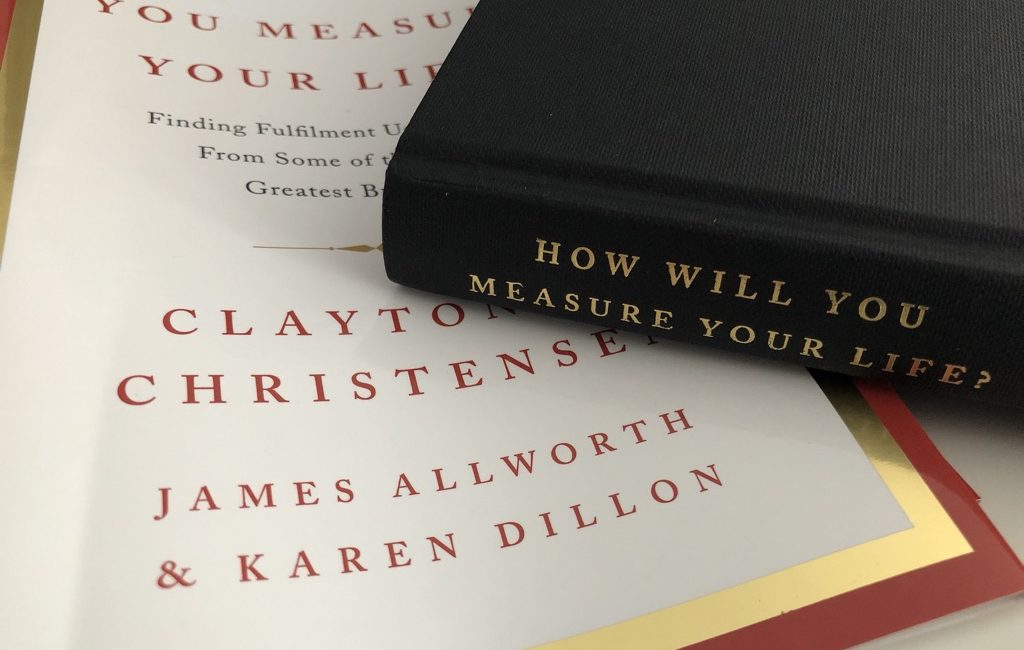How Will You Measure Your Life – Clayton M. Christensen

My favorite quotes from a remarkable book called How Will You Measure Your Life? by Clayton M. Christensen, James Allworth, and Karen Dillon.
How can I be sure that:
- I will be successful and happy in my career?
- My relationships with my spouse, my children, and my extended family and close friends become an enduring source of happiness?
- I live a life of integrity – and stay out of jail?
He’s forgotten more than I will ever know about his business.
People often think that the best way to predict the future is by collecting as much data as possible before making a decision. But this is like driving a car looking only at the rearview mirror – because data is only available about the past.
The only way a strategy can get implemented is if we dedicate resources to it. Good intentions are not enough – you’re not implementing the strategy that you intend if you don’t spend your time, your money, and your talent in a way that is consistent with your intentions.
True motivation is getting people to do something because they want to do it.
Hygiene factors are things like status, compensation, job security, work conditions, company policies, and supervisory practices. Motivation factors include challenging work, recognition, responsibility, and personal growth.
⚠️ If you want to help other people, be a manager. If done well, management is among the most noble of professions.
Find a job that you love, and you’ll never work a day in your life.
When you find out what really works for you, then it’s time to flip from an emergent strategy to a deliberate one.
It’s really not until twenty years down the road that you can put your hands on your hips and say, “We raised good kids”.
But there is much more to life than your career. The person you are at work and the amount of time you spend there will impact the person you are outside of work with your family and close friends. In my experience, high-achievers focus a great deal on becoming the person they want to be at work – and far too little on the person they want to be at home. Investing our time and energy in raising wonderful children or deepening our love with our spouse often doesn’t return clear evidence of success for many years.
The relationships you have with family and close friends are going to be the most important sources of happiness in your life.
Capital that seeks growth before profit is bad capital.
The path to happiness is about finding someone who you want to make happy, someone whose happiness is worth devoting yourself to.
If a company has strong processes in place, managers have flexibility about which employees they put on which assignments – because the process will work regardless of who performs it.
Self-esteem comes from achieving something important when it’s hard to do.
If your children gain their priorities and values from other people – whose children are they?
Helping your children learn how to do difficult things is one of the most important roles of a parent.
Encourage them to stretch – to aim for lofty goals. If they don’t succeed, make sure you’re there to help them learn the right lesson: that when you aim to achieve great things, it is inevitable that sometimes you’re not going to make it. Urge them to pick themselves up, dust themselves off, and try again. Tell them that if they’re not occasionally failing, then they’re not aiming high enough. Everyone knows how to celebrate success, but you should also celebrate failure if it’s a result of a child striving for an out-of-reach goal.
Allow the child to see the consequences of neglecting an important assignment.
Culture in any organization is formed through repetition.
It’s easier to hold to your principles 100 percent of the time than it is to hold to them 98 percent of the time.
The only metric that will truly matter to my life are the individuals whom I have been able to help, one by one, to become better people.
⚠️ Treat people as if they were what they ought to be and you help them become what they are capable of being.
My notes from a remarkable #book How Will You Measure Your Life by Clayton M. Christensen https://t.co/wh8doLxSI2
— Nikola Brežnjak (@HitmanHR) February 19, 2019




Leave a Comment